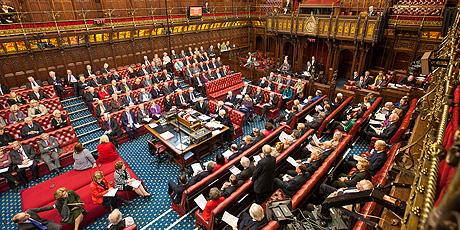Peers have backed a 'meaningful' vote on Brexit - and what happens next is up to MPs. Will Tory rebels hold out or give in to the whips?

It’s one defeat after another for the Tories. And last night the government were given a proper drubbing, after the House of Lords demanded Parliament be given a ‘meaningful’ vote on the Brexit Deal.
The cross-party motion says that if Parliament votes down the Article 50 deal, it is Parliament – not ministers – which must decide what happens next.
As Labour’s Keir Starmer noted, it means: “Under no circumstances can the Prime Minister be given a blank cheque to crash the UK out of the EU without a deal.”
This is the government’s seventh House of Lords defeat on the EU Withdrawal Bill – with peers voting 335 to 244 in favour of the amendment.
In the debate, Tory peer Viscount Hailsham set out why the move was essential:
“If terms have been agreed, the choices available to Parliament, and in particular to the House of Commons, should obviously be to accept or to reject those terms. If the decision is to reject the terms, Parliament should have the right to suggest further negotiations…or to determine that we leave the European Union without terms—that is, to crash out; or to determine that we stay in the European Union on the existing terms.
“In the event that no terms have been agreed, the same choices should be available to Parliament: that is, to accept that the country should leave the European Union on no terms; or to determine that the country should stay in the European Union on the existing terms; or to request further negotiations…
“In other words, whatever the outcome, terms or no terms, this country’s future should be determined by Parliament, ultimately by the House of Commons, and not by Ministers. In a parliamentary democracy, that is what ought to be meant by “a meaningful vote”.”
The motion set out in clear words that the Conservatives “may implement a withdrawal agreement only if Parliament has approved the withdrawal agreement and any transitional measures agreed within or alongside it by an Act of Parliament.”
The Tory frontbench have predictably been out in force already, saying the decision ‘thwarts the will of the British people’.
Yet it seems unlikely that voters will buy their line, given that the party originally tried avoid any Parliamentary say over Brexit – despite all the talk about Parliamentary sovereignty and ‘taking back control’ during the referendum.
It will now be up to MPs to decide whether to support the Lords’ call.
In response, Best for Britain chair Lord Malloch Brown said the Lords’ move was a ‘turning point’:
“The Lords has done its duty. We have restored the right of the Commons and then the People to have the final say on the Brexit deal.
“We continue to fight on and take our argument to the country. We can, and must win.”
And the Lib Dems’ leader in the House of Lords Dick Newby said the decision ‘puts Parliament in the driving seat’:
“[This] ensures that the government will follow the directive of the House of Commons, no matter what the result of the negotiations with the EU.
“Brexit is the most important decision facing the country for a generation and it is vital that Parliament – not the government – decides whether or not any Brexit deal is acceptable.”
Interestingly, the move does open the door to a fresh public vote.
As the Greens’ Caroline Lucas MP, a leading supporter of the People’s Vote campaign, said:
“Crucially, [this] would also pave the way for a vote to ensure the decision over whether we accept the final Brexit deal or not is made by the public – not just politicians – through a People’s Vote.”
Yet peers rejected an amendment to directly give the public a vote on the final deal, after Labour’s frontbench refused to back the move.
Lord Newby poured scorn on Labour’s the decision:
“Liberal Democrats will continue the campaign for a people’s vote on the final deal, but we need Labour’s support, and I call on them to back us in giving the public the final say.”
Either way, what happens next is up to MPs. Will rebels support giving themselves a say on the deal – or give in to the Tory whips?
To reach hundreds of thousands of new readers we need to grow our donor base substantially.
That's why in 2024, we are seeking to generate 150 additional regular donors to support Left Foot Forward's work.
We still need another 117 people to donate to hit the target. You can help. Donate today.



